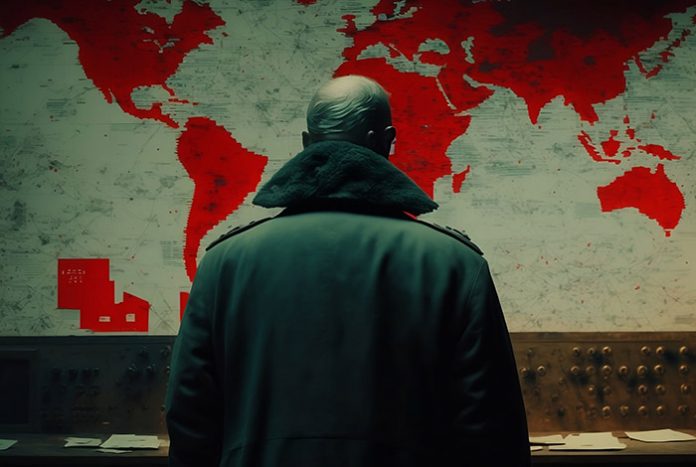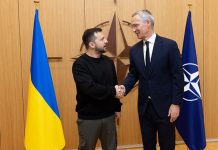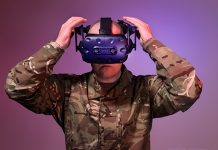“History does not only provide ammunition for politicians or history nerds, it is also of vital importance for the military. History does not provide clear tactical, operational or even strategic guidelines for the future, but dealing with the actions of the past can sharpen one’s mind and help to understand wider contexts.” – Professor Matthias Strohn, head of historical analysis at CHACR, on why Putin’s twisted take on the past is a reminder of history’s role in honing fighting power.
Read the digital document above, download a copy here or continuing reading below.
In a much-talked about interview recorded on 6th February, Vladimir Putin presented his view of the world and the war in the Ukraine. He opened his statements with what he called a “short reference to history, only 30 seconds or a minute”. Approximately 30 minutes later Putin had provided a history lesson taking the interviewer, Tucker Carlson, all the way back to the early Middle Ages, and from there on a tour de force of Putin’s interpretation of history. Regardless of whether one agrees with his view or not, it is interesting to note that history clearly took centre stage during the interview.
So, history clearly matters to Putin. This might come as a bit of a surprise to people in the west, where history as a framework has attracted less attention in the recent past. It would be difficult to imagine a western leader justifying his or her actions with a 30-minute speech on historical events. And yet, as seen by Putin’s statements, history does matter. Not only to the Russian leader, but to all states, nations and peoples. All of these have been shaped by history, and their national and personal histories continue to shape views, beliefs and actions at all levels of human interaction. Taking ownership of a “national history” is therefore important for autocratic rulers, because it strengthens their position within the state, creates an intellectual uniformity and ensures the nation’s support. This is exactly what Putin is trying to achieve with his interpretation of history. In many ways, the interview and the history lesson are thus directed more at the internal Russian viewers than the foreign market.
The obvious issue with this is that history is not an exact science. Events are constantly re-evaluated and re-interpreted, often through contemporary moral and social lenses. Unlike in sciences, a plus b does not always equal c, but can equal d, e or f. If history was an exact science, we would have one book on the battle of the Somme, and this would be enough to tell us what ‘really’ happened. A quick glance at the shelves in the military history section of any bookshop will show you that things are not that simple. This opens the door for the politicisation of history, and Putin’s use of historical events is a good example of this. Only a good and comprehensive understanding of history and historical facts can counter this development. And yet, history remains the only plausible framework and foundation for our interpretation of events. The fact that analysis and interpretations shift and views change is a mirror of human interaction at all levels. It also puts our actions, perceptions, etc into perspective. In what I call the “arrogance of the present” we always think that our times are more complex, more difficult, better or worse than previous days. But are they really? I am sure that most people from the past would have happily exchanged their existence for a life in the 21st century, despite the issues and tensions that we face today.
Why am I writing about this and why and how is all of this relevant for the Army? Well, history does not only provide ammunition for politicians or history nerds, it is also of vital importance for the military. History does not provide clear tactical, operational or even strategic guidelines for the future, but dealing with the actions of the past can sharpen one’s mind and help to understand wider contexts. In times of financial restraint and questions surrounding the manpower of the armed forces, it is perhaps understandable that many people look at the hard facts and figures of the physical component of fighting power: How many tanks does the Army have, how many battalions can it put it in the field? However, the physical component is only one of the three parts that make up fighting power. In this trinity, the physical, moral and conceptual components are of equal importance. And it is in the latter two that history can, should and must play a role. The moral component decides the will of an army to fight. Without it, numbers are meaningless. Armies need to understand why they fight, and this understanding can take many forms. There are states that link the fighting to higher moral or political values, such as the idea that a form of government or a societal contract has to be defended. In reality, however, such abstract constructs do not provide the necessary will to fight once the bullets start flying all around you, and we need to look somewhere else for motivation and inspiration. We know that traditions, values and standards that are handed from one generation to the next are highly motivating factors for armies, and those armies that lack these, or have done away with them, often face problems when they have to send troops into battle. Understanding the historical foundations of the Army, the history of one’s unit or formation – all of these aspects contribute to creating this bond between the present and the past. It is this understanding and the heritage which make the Army an institution rather than a mere organisation.
The conceptual component, the third part of the fighting power trinity, also benefits enormously from historical analysis. We do not have crystal balls and cannot predict the future. We can, and therefore must, however, look back into the past. Analysing past events does not provide a panacea for all current and future problems, but it remains the best tool to think about human affairs, of which war and warfare are parts. One has to be careful, though. Shallow analysis and half-baked historical understanding can lead to wrong conclusions. This is why it is important to think about historical events in width, depth and context, as Professor Sir Michael Howard explained in his influential article The Use and Abuse of Military History. By width he meant that we need to analyse history over long periods of time and across many perspectives. By depth Sir Michael meant that no stone should be left unturned when carrying out research. Context means that we need to understand the bigger picture, such as the societies that armies and soldiers come from, because armies do not live and operate in vacuums.
Battlefield studies remain a very useful tool to achieve this comprehensive understanding of past events; done well, these studies tick all the boxes of the analytical framework that Sir Michael developed. The historical knowledge gained should then form the foundation of debate and analysis of current (military) issues. The past becomes the enabler for analysis and, therefore, the value of battlefield studies cannot be overestimated. They should not be seen as nice-to-haves, but they are core business for the Army, as the late Richard Holmes told us. They are an essential and integral component of training, education and, thus, the enhancement of the conceptual component of fighting power (and they are comparatively cheap, too). It should therefore not surprise us that a number of armed forces, for instance the Swedish, are currently increasing their battlefield studies footprint.
Putin is not a military man, and I am not sure if he thought about all of these points when he started his history lecture. Having said this, he clearly understands the importance of history, its power of persuasion and its impact on our lives in the 21st century. Otherwise, he would have stuck to the 30 seconds that he said it would take to make his points on history. For Putin, however, history can also be a tool not just to understand better the routes that bring us to the present, but also as a tool to manipulate the future – his is a history anchored on facts, but twisted, manipulated, deliberately misunderstood and re-dressed to manipulate the moral (and conceptual) components not only of his nation’s fighting power, but of its world view. This not only gives him domestic leverage, but also gives him the armour of justification when addressing allies and enemies alike. So, if you ever thought that history was boring or irrelevant, you might want to think again. Putin certainly would not agree with you.





